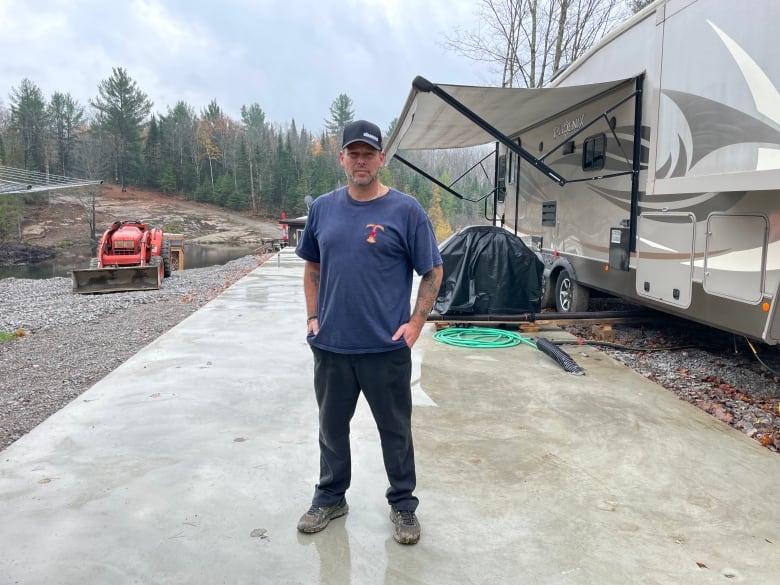

Facing sky-high connection fees, rural Ontarians go off the grid
source link: https://www.cbc.ca/news/canada/toronto/wind-solar-power-rural-ontario-1.6224159
Go to the source link to view the article. You can view the picture content, updated content and better typesetting reading experience. If the link is broken, please click the button below to view the snapshot at that time.
Facing sky-high connection fees, rural Ontarians go off the grid
Social Sharing
New connections to provincial power grid can cost tens of thousands of dollars

When Craig Timmermans set out to build a new headquarters for his companies in northern Ontario, he reached out to the power company to find out how much it would charge him to connect to the grid.
He says he expected to pay a few thousand dollars, given that the nearest pole was across the street, about 45 metres away. He was shocked to find out it would cost $80,000.
"I thought that was just totally outrageous," Timmermans told CBC News.
Hydro One, which distributes electricity for most rural customers in the province, eventually reduced the cost to $25,000. It was still too much, according to Timmermans.
"And then on top of that, to pay, you know, an electric bill, probably at around four to five hundred dollars a month for the rest of my life and only increasing. I thought, well, now's the time to go off-grid."
Last summer, Timmermans's two radio stations: Great Lakes Country 103.1 and Hits 100.7 went live from their new home — in Little Current, Ont., about 90 kilometres southwest of Sudbury — the first off-grid stations in Canada.

They, along with the internet service provider Timmermans also owns, are powered by 24 solar panels and a wind turbine.
Combined, the system produces eight kilowatt hours — more than enough to run his offices, radio studios, the central air conditioning and the servers that keep his internet customers connected year 'round, he says.
It cost him $23,000.
"But on top of that, we have no more [power] bills after that," Timmermans said.
In winter, he says he needs a propane furnace to heat the building.
A separate wind-and-solar array mostly powers the stations' transmitters, which belt out 77,500 watts of radio signal as far south as the Bruce Peninsula. The rest comes from the traditional power grid, but not for long, Timmermans hopes.

Powering the transmitters used to cost a small fortune: $6,000 a month, he says.
"Our current rate is about $1,500," he told CBC News.
"With more solar panels that we're installing currently, I hope to bring that bill down closer to zero and we'll basically use Hydro One as a backup. And so what that basically means is savings of $6,000. That's another employee that we're going to hire."
Timmermans is one of a number of rural Ontarians who, put off by high connection costs, have left the grid in favour of renewable energies.
"The cost of solar and battery storage systems have both decreased by approximately 90 per cent since 2010," said Nicholas Gall of the Canadian Renewable Energy Association.
"Today a solar and battery storage system that would enable a homeowner to be entirely self-sufficient could be obtained for as little as $50,000, fully installed."

Gall says there are no statistics on how many Canadians are going off grid, but says it's easier than ever.
"In addition to avoiding rising utility costs, going off-grid can be an appealing option for homeowners seeking to reduce their environmental footprint, and to provide greater resiliency from blackouts caused by extreme weather events, which are likely to increase as a result of climate change."
But there are benefits to being on the grid, says Teresa Sarkesion, president and CEO of Ontario's Electrical Distribution Association.
"Reliability is a top priority for Ontario's electricity customers and that is a key benefit of being connected to the grid in addition to peace of mind and value for money," she said in a statement.
Chris Hartwell also pulled the plug after learning a connection for his new home near Minden — a town 193 kilometres northeast of Toronto, in Ontario's cottage country — would cost at least $80,000.
"They kind of gave me no other option but to go off-grid," said the 49-year-old veteran.
The provincial regulator requires customers who buy properties not hooked up to the electricity system to pay the cost of connecting, according to a spokesperson for Hydro One.
The company serves about 1.5 million mostly rural customers, and adds about 18,000 customer connections per year, according to a spokesperson.
Hartwell's property is on a 2.5-kilometre stretch of road where there's a gap in the power lines. The nearest pole to connect to is about one kilometre away.
CBC News previously reported on his neighbour, Allan Robinson, who also lives within that gap. Connecting his newly built home would have cost $60,000.
Hartwell is instead putting in a solar system for $42,500 that is expected to fully electrify his home. A propane furnace will provide heat.
"I have no use for Hydro. I have no use for the bills anymore," he said.
ABOUT THE AUTHOR
Senior Reporter, CBC Toronto
John Lancaster is a senior reporter with CBC News focusing on investigative and enterprise journalism. His stories have taken him across Canada, the US and the Caribbean. His reports have appeared on CBC Toronto, The National, CBC's Marketplace, The Fifth Estate-and of course CBC online and radio. Drop him a line anytime at [email protected].
Recommend
About Joyk
Aggregate valuable and interesting links.
Joyk means Joy of geeK